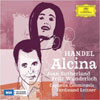Handel Alcina
A fascinating 50-year-old snapshot of what was considered ‘period’ style
View record and artist detailsRecord and Artist Details
Composer or Director: George Frideric Handel
Genre:
Opera
Label: Deutsche Grammophon
Magazine Review Date: 5/2010
Media Format: CD or Download
Media Runtime: 152
Mastering:
Stereo
Mono
ADD
Catalogue Number: 477 8017GH2

Tracks:
| Composition | Artist Credit |
|---|---|
| Alcina |
George Frideric Handel, Composer
Capella Coloniensis Cologne Radio Chorus Ferdinand Leitner, Conductor Fritz Wunderlich, Ruggiero, Mezzo soprano George Frideric Handel, Composer Jeannette van Dijck, Morgana, Soprano Joan Sutherland, Alcina, Soprano Nicola Monti, Oronte, Tenor Norma Procter, Bradamante, Contralto (Female alto) Thomas Hemsley, Melisso, Bass |
Author: David Vickers
However, it would be churlish to deny that Sutherland & Co share some good things with modern listeners. This is all the more remarkable because the two leading singers had only joined the project a few days before the recording; the original soprano could not cope with the demands that Handel made of her voice, and the original tenor had learnt the wrong part. The orchestra make heavy weather of the Overture, but after that much of the instrumental contribution seems quite promising until too many of the singers pull things back (likewise, the entry of the chorus in “Questo è il cielo” is quite an unpleasant shock after a nicely judged introductory ritornello). None of the soloists are bad, but recitatives are laborious, and their singing (especially the men) is prone to sagging and dragging. However, Norma Procter’s impressive Bradamante stands the test of time, and Sutherland’s crystalline singing reminds us that she was an important Handelian champion. There is no doubt that performances such as this contributed significantly to the modern renaissance of Handel’s operas, but those wanting something more fully representative of Handel’s masterpiece may opt for Alan Curtis’s new recording (reviewed on page 109).
Discover the world's largest classical music catalogue with Presto Music.

Gramophone Digital Club
- Digital Edition
- Digital Archive
- Reviews Database
- Full website access
From £8.75 / month
Subscribe
Gramophone Full Club
- Print Edition
- Digital Edition
- Digital Archive
- Reviews Database
- Full website access
From £11.00 / month
Subscribe
If you are a library, university or other organisation that would be interested in an institutional subscription to Gramophone please click here for further information.




